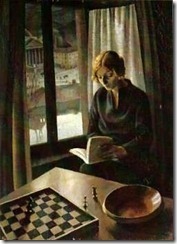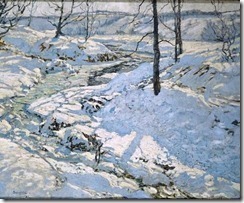Riley Adams's Blog, page 217
January 10, 2011
More Thoughts on Using Lists to Write
 I love making lists. I make lists of things to do, things to get at the store, and things I want to accomplish for the year.
I love making lists. I make lists of things to do, things to get at the store, and things I want to accomplish for the year.
And, as I mentioned in this post in September, I frequently use lists while writing, too. To recap that post, I've found that making lists can help me advance my plot when I don't have much time (I can list all the ways I can think of…from zany to useful…to approach the next scene), or to make my setting come alive (a list of one particular setting, using each of the five senses to describe it), or to develop my character or my understanding of a character (top 5 things my character cares about, top 5 things that keeps my protagonist up at night.)
My writing friend Jemi Fraser of the Just Jemi blog posted recently on her frustration with her lack of writing time lately. She's frequently getting only twenty minutes a day or fewer to work on her book.
The nice thing about lists is that you can keep a small notebook with you and even if you only have 5 minutes to write, you can make some short lists of things like your character's traits, ways the character can grow during the course of the book, possible subplots, etc.
I've also found that making lists has made me a less-tentative writer. I used to obsess a little over my book's beginning and ending. I would write several different options for the first chapter and the closing chapter of the book, then choose which I liked best.
When you make lists of your possibilities instead, I've found that somehow it puts my anxiety to rest—and I can more quickly explore the different options and see which is better.
You can also curb your desire to stop writing and research part of your book by listing the different things you need to look up. Not happy with a character name or the name of your fictitious town? You don't have to fix it right then…just start a list called "names" and add to it when you come across them. You can always call a character A or B and fill the names in later.
Making lists also comes in handy when you have plot holes. My editor emailed me last week and pointed out a problem area with the third Memphis Barbeque book. Somehow I hadn't noticed it during my revisions, but it was definitely something that needed to be fixed.
I made a list of all the different ways I could think of to work my way out of the mess. When I thought I'd come up with all of them, I kept on going and found some additional solutions. It was easy to come up with the strongest solution when I saw the possibilities together.
Are you a list-maker, too? Have you tried using lists to help write your story?
January 9, 2011
On Critiquing—When to Offer Suggestions
 I've never thought of myself as a good book reviewer. I'm definitely not a good critiquer—my technique is really just an overwhelming desire to rewrite a problem area in someone's manuscript. I can tell when something isn't working…I have a hard time pinpointing why it's not working. I just want to fix it. (No, I'm not in any crit groups now.) :)
I've never thought of myself as a good book reviewer. I'm definitely not a good critiquer—my technique is really just an overwhelming desire to rewrite a problem area in someone's manuscript. I can tell when something isn't working…I have a hard time pinpointing why it's not working. I just want to fix it. (No, I'm not in any crit groups now.) :)
My son was working on a literary criticism project for his English class. He's a competent writer, although he's usually not enthusiastic about doing it.
This time, he handed me his paper. "Take a look at this!" he said, smiling.
He'd written a good thesis. He'd come up with several pages to support it…except there were two paragraphs that didn't tie into his thesis at all. The paragraphs were on how the author's word choice created a certain mood.
Well….the author's word choice did create a somber mood. He was right about that. But he hadn't tied the examples into his thesis at all.
I was about to say, "Hey, it looks great. But you might want to look at these paragraphs here and see if you can find a problem…" But then I stopped.
He was excited about writing. He hadn't finished his essay yet. Right now he was enthusiastic and productive. Why mess with momentum?
So I brought it up after he was finished writing the paper. He was glad I'd pointed out that he should make sure that everything tied into his thesis, but he'd rather have fixed the problem as he'd gone along—and he'd continued making the same error a couple more times after he'd finished writing the essay.
Pros to biting your tongue--
The writer might continue writing with confidence and enthusiasm.
Editing can happen just as well in the second draft.
Pros to pointing out a potential problem with a manuscript--
The writer has an opportunity to decide if it is a problem…and correct it before they go on any farther.
Does the critique you give depend on the writer looking for advice? And how do you feel about constructive criticism…would you rather have it during your first draft, or after?
January 8, 2011
Twitterific
![Terry3_thumb[1]](https://i.gr-assets.com/images/S/compressed.photo.goodreads.com/hostedimages/1380446552i/1619614.png) Here are writing links that I've posted to Twitter for the past week.
Here are writing links that I've posted to Twitter for the past week.
If you're looking for a particular topic, just plug in your keyword into the search box at the top left-hand corner of the blog (on the black header right above my blog name…next to the Blogger symbol…the small search window is next to the magnifying glass) and the roundup with your subject will come up. To narrow your search down on the page, do a CTRL+F, type your subject, and hit enter.
I'm also archiving these posts in what I hope is an easily searchable format—if you look at the Twitterific tabs under the blog's heading, I'm posting the links there, too.
Why complications and setbacks are good for police procedurals and other crime fiction: http://dld.bz/EJtv @mkinberg
The importance of context: http://dld.bz/EEEV
Changing Format to Increase Impact: http://dld.bz/EHTK
Pronoun peeves: http://dld.bz/EEEA
A bit on emotional structure: http://dld.bz/EHTu
Choose-Your-Own-Illustrator! or Don't. No, Really, Don't. : http://dld.bz/EEE2
How to speak publisher - B is for Bologna: http://dld.bz/EEEu
To be a better writer, you've got to write...a lot: http://dld.bz/EJqp @camillelaguire
Writing Memoir: Art vs. Confessional: http://dld.bz/EEEq
Want to keep your book timeless? Avoid these areas that might date it: http://dld.bz/EJs7 @mkinberg
Is E-book Lending Bad News for Authors and Publishers? http://dld.bz/EEEd
New Worlds: Stranger than Fiction: http://dld.bz/EHTg
The 15 Best Speculative Fiction Books of 2010: http://dld.bz/EEEb
Huckleberry Finn: The problem of that word (Globe and Mail): http://dld.bz/EEDZ
Myst. Lov. Kitchen: WHAT COLOR IS SWEET? http://bit.ly/foahKi @CleoCoyle
11 Free Resources About Creativity: http://dld.bz/E7RR
4 steps to turn a writing dream into reality: http://dld.bz/E7Rv
The essence of attraction: http://dld.bz/ECCH
The Writer as multi-tasker? http://dld.bz/EC9t
Suturing: Making Our Readers One With the Story: http://dld.bz/EC8R
Outlining the first draft: http://dld.bz/EC8y
Creating tension in your novel: http://dld.bz/EC8q
Taking on the Procrastination Pixies by…Eating Frogs? http://dld.bz/EC5D @KristenLambTX
Impressive, organized link roundup of writing craft links (including POV and syntax): http://dld.bz/EC5d @4kidlit
How Authors Can Use Facebook Pages for Their Book Marketing: http://dld.bz/E7UV
Publishers losing confidence in Borders' survival: http://dld.bz/E7UP
Friends, Romans, Librarians: Lend Me Your E-books (Part 2): http://dld.bz/E7U8
The importance of subplots: http://dld.bz/E7Uy
3 ways writers evolve over time: http://dld.bz/E7Uq
Interested in writing or illustrating graphic novels? A little on the process: http://dld.bz/E7TR
Criminal forensics resources for writers: http://dld.bz/E7T3
How To Create A Book Trailer: http://dld.bz/E7QW @thecreativepenn
Huck Finn Expurgated And Other Censored Books (Photo essay--Huff Post): http://dld.bz/EzFg
How to Write a Good Blog Comment: http://dld.bz/EyHN
One writer's 7 point plan for a better writing year: http://dld.bz/EzHb @charmaineclancy
Symbolism Thesaurus Entry: Evil: http://dld.bz/EyHE
4 free data tools for journalists (and snoops): http://dld.bz/EyH7
Getting Defensive Over Your Work Isn't Always Bad: http://dld.bz/EyHv
Myst. Lov. Kitchen: Cheese Slices (Dessert!) and a Contest! http://bit.ly/fl6ZTe @CleoCoyle
Perspective, Opinion, and Point Of View — Distinctions That Matter To Writers And Readers: http://dld.bz/Exv4
8 Sentences to Immediately Cut From Your Twitter Bio: http://dld.bz/EyB3
How to Get More Mobile Visitors Onto Your Email List: http://dld.bz/EyBs
Outlining and series: http://dld.bz/EyBe
Who is That Guy? Discovering Your Characters: http://dld.bz/EyA8
Friends, Romans, Librarians: Lend Me Your E-book (Part 1): http://dld.bz/EyAm
Skype interviews for writers: http://dld.bz/Ey9Z
13 Reasons Why You Didn't Get Followed Back: http://dld.bz/Ey9J
How to punctuate quotations: http://dld.bz/Ey9F
2010 Tax Rules Freelancers Should Know: http://dld.bz/Exwf
Nice agent interview, covering market trends in publishing and thoughts on author platform: http://dld.bz/EzDk @ChuckSambuchino
Making books do things e-books can't — and vice versa (LA Times): http://dld.bz/Exvm
Have you backed up recently? http://dld.bz/Exur
Slow and steady wins the race: http://dld.bz/Exna
The Creative Road to a Great Book Title: http://dld.bz/Esvh
Interviewing characters? Interview yourself: http://dld.bz/EsuX
Should agents stop taking emailed submissions? http://dld.bz/ExtK @RachelleGardner
10 Rules for a Literary Feud: http://dld.bz/EsuS
Tips for proofing your own work: http://t.co/gT6KYdF @camillelaguire
11 New Year's Resolutions for Writers in 2011: http://dld.bz/Esu6 @victoriamixon
Two Authors Talk About Virtual Book Tours (Huff Post): http://dld.bz/Esux
The balancing act of pacing: http://dld.bz/Esum
Myst. Lov. Kitchen: Football Frenzy - Potato Salad http://bit.ly/dJtiTi @CleoCoyle
Name your fictional character: http://dld.bz/EstZ
A writer's top 10 New Year's Resolutions: http://dld.bz/EstV
A Thought From A Reformed Pantser: http://dld.bz/Est7
2010: The Year Self-Publishing Lost Its Stigma (PBS): http://dld.bz/Estr
Myst. Lov. Kitchen: A Sweet Start to the Year--Chocolate Pecan Bark http://bit.ly/fklrma @CleoCoyle
Motivation and writing: http://dld.bz/EnrR
Thanks to Joanna @thecreativepenn for a great interview this afternoon. Looking forward to tweeting the link. :)
Top Ten List of Advice for Aspiring Writers: http://dld.bz/EnrF
PR Success – PR Failure: http://dld.bz/Enr2
Writing teen angst: http://dld.bz/EnqV
The Counter-intuitive Nature of Social Media Influence. Sometimes Up is Down & Down is Up: http://dld.bz/Enq8
Don't get bogged down in research...write your book: http://dld.bz/EnnU
16 Must Have Elements For a Successful Novel: http://dld.bz/Ennm
Ten Surprising Ways to Thrive as a Freelance Writer (Huff Post): http://dld.bz/Enmw
Does your pitch make sense? http://dld.bz/EnkB
Revisionist Attitude: Mentally Preparing for Revisions: http://dld.bz/Enqb
Getting published--goals vs. strategies: http://dld.bz/EmRq
Best Literary Magazines of 2010: http://dld.bz/Ennv
Selling readers short--why we shouldn't state the obvious: http://dld.bz/EmPQ @hartjohnson
Digital Lending: How it works and who allows it: http://dld.bz/EdF9
Momming and Writing: http://dld.bz/EdFw
Mystery writer's guide to forensic science--poisons: http://dld.bz/EdFe @clarissadraper
Researching Your Novel: Setting: http://dld.bz/EdEX
Thoughts on the Unreal, Part 1: Anticipation: http://dld.bz/EdE4
How to avoid getting an agent: http://dld.bz/EdDV
What matters to our characters: http://dld.bz/EdhS
Creating Unforgettable Settings: http://dld.bz/Edhy
11 Tips for Getting the Most out of "Writer's Market": http://dld.bz/Edhv
Resources for Authors Traveling To Book Clubs & Schools: http://dld.bz/Ec9Z
Creating An Author Brand: Why It's Not Really About the Book: http://dld.bz/EaBf
How To Start 2011 Off Right: http://dld.bz/EaAf
Struggling Borders to Meet With Publishers (NY Times): http://dld.bz/Ec8W
20 people who rocked science fiction and fantasy in 2010: http://dld.bz/Ea9B
The Changing Role of Libraries in the Digital Age (Huff Post): http://dld.bz/Ea95
A Writer's Plot Board: Getting organized: http://dld.bz/Ea55 @4kidlit
Master This Skill Before Setting New Writing Goals: http://dld.bz/Ea5w
Eight Writing Lessons from Larsson: http://dld.bz/Ea4Y @jammer0501
How to Bring Sexy Back to Book Signings: http://dld.bz/DRyZ
Writing sins that scupper a story Part 3: Salt: http://dld.bz/DQKN
Putting Life Back Into Overly Revised Novels: http://dld.bz/DQK5
How To Be The Person You Want To Be: http://dld.bz/DQKv
7 Ways to Kick Start Your Day: http://dld.bz/DQKa
You might be a writer if... http://dld.bz/DQJ6
Kindle kicks Harry Potter out of top-selling spot on Amazon: http://dld.bz/DKdj
Real authors writing fake books (Globe and Mail): http://dld.bz/DQHP
The Borders death spiral: http://dld.bz/DQHE
Blogging--the future is now: http://dld.bz/DQHc
10 Writing Resolutions You Can Fulfill: http://dld.bz/DQGQ
Writing sins that scupper a story--part 2 (Dr. Who, Runaway Bride): http://dld.bz/DQG2 @dirtywhitecandy
Plotting From the Antag's POV: http://dld.bz/DQGj
Finish It! 5 Simple Tips to Make More Time for Writing: http://dld.bz/DRyA @matthewschulz
How to Create an Engaging and Effective Bio Page for Your Blog or Website: http://dld.bz/DQGd
3 Tactics for Battling Procrastination: http://dld.bz/DK9g
Writing sins that scupper a story--part 1: http://dld.bz/DK8M @dirtywhitecandy
How to Set Goals That Make Sense: A Writer's Perspective: http://dld.bz/DK8v
Brainstorming: Give the People What They Want: http://dld.bz/DK8t
What first lines *should* do: http://dld.bz/DK8r
See you at the goal line: http://dld.bz/DKev
How A Spreadsheet Can Save Your Manuscript: http://dld.bz/DQTN @matthewschulz
Can Authors Now Do It Digitally Themselves? http://dld.bz/DKed
Are We Being a Responsible Novel Parent or a Deadbeat Book-Daddy? http://dld.bz/DKeb
Writer's Laryngitis - Getting Your Voice Back Again: http://dld.bz/DKdX
Deadlines are meant to be broken: http://dld.bz/DKds
Cooking up a character: http://dld.bz/DKdf
January 7, 2011
Should We Finish Writing a Bad Book (If it's our First Novel?)
 I've forgotten a lot about learning new skills as a child. Riding a bike? Roller skating? Swimming? I learned how to do those things, but my memory is shaky on it. It comes back to me in flashes, though, when I see my kids mastering new skills.
I've forgotten a lot about learning new skills as a child. Riding a bike? Roller skating? Swimming? I learned how to do those things, but my memory is shaky on it. It comes back to me in flashes, though, when I see my kids mastering new skills.
It took my daughter years to even want to ride a bike. When she finally agreed to have me help her learn, she was terrified the whole time. A couple of times she asked me to put the training wheels back on her bike.
But—once she got it, she got it. And all she wanted to do all day long was ride a bike. She felt completely confident and triumphant and she wanted to practice (and show off) her new skill as much as she could.
Same with my son and ice skating. And my daughter with roller skating.
I was really the same way with writing a book. I messed around with manuscripts in my twenties. I'd get an idea, fall in love with the idea, fervently start writing the idea.
Then I'd get to the point where I lost faith in my ability to finish the book, or I'd fall out of love with the idea, or I'd get a shiny new idea that seemed a lot better.
I think there were three unfinished manuscripts.
The writing I did was still helpful to me. I got a lot of practice and a better feel for my voice.
But I didn't feel confident. I still thought I might fall off the bike. I hadn't been able to follow a book through to completion.
If I had finished one of those books, it would still have been a book that needed a lot of work. And one of the unfinished manuscripts would have been a real stinker of a bad book.
At least, though, I'd have had the confidence that I could finish the book. And that would have gotten me writing more and more. Writing more and more would have made my writing better, quicker.
It would have been like my kids, mastering their new skills and then skating and biking like crazy—reveling in the skill.
Is it worth it to finish a bad book? I think it is. Unless you get a shiny new idea that comes into your head almost fully-realized. I think it's important to prove to ourselves that we can finish a book. Even if it's not marketable, even if it's just for ourselves. Because the second book will be better.
What do you think? Finish a bad book…or start working on a better idea? How many manuscripts do you have in your manuscript graveyard (I've admitted to three…) :)
January 6, 2011
The Importance of Subplots
 In my role as Mommy, I drive a carpool with another neighborhood mom to the elementary school and the middle school. I drive mornings, and she drives afternoons.
In my role as Mommy, I drive a carpool with another neighborhood mom to the elementary school and the middle school. I drive mornings, and she drives afternoons.
The carpools are early, with the elementary one running at 6:45 and the middle school one at 7:15. The kids are sometimes a little bleary-eyed. The traffic is heavy and slow. Occasionally, conversation drags a bit.
I'll try to get their brains moving in an academic direction. "So, it's Friday. What's going on at school today?"
I'll usually get a desultory recitation from one of the kids about Algebra or P.E. or the new book they're reading in Language Arts and sometimes the other child will chime in with more information or to dispute the facts the other is offering ("No, the test is on Tuesday.")
It's sort of the running main plot of our carpool: What's going on at school today and are you prepared for it? The kids would be shocked if I didn't ask, I'm sure. I also do a little monologue on the weather…that's always popular. :)
Then I move onto other things and it's interesting how both carpools come to life.
With the elementary carpool (all girls) we have a sort of running fascination with the way the food service truck tries to cut through the extremely backed-up carpool line to get to the loading dock at the back of the school cafeteria. Why does he always come at 7:00 a.m.? If he always runs into the same problem, why not come earlier or later? Does he actually enjoy this daily dose of frustration? Will the carpool allow him to cut through or will it be a sort of automotive Red Rover game? The girls could speculate over all these things endlessly.
With the middle school (boy) carpool, we have another running storyline. It involves the lunchroom ladies and their wretched attempts to park their cars each day. One lady, driving a minivan, takes up four spaces, with one tire in each spot. Two other lunch ladies take up two spaces apiece. We speculate on this, too. Why do they park so poorly? Can't they tell they're not in one spot? Is it all a special plot—for lunch ladies only-- that we just know nothing about? Do they have plans for taking over even more parking spaces…maybe by adding a trailer to their cars or dangling a long ladder out the back?
It's very idle, silly, talk—but these topics provide a serial story for my bored carpoolers each day.
I think that's the part that subplots play. They offer some relief from the main plot. Some variety.
Sometimes subplots show a steady progression toward a conclusion when the main plot still seems hopelessly entangled and rife with setbacks.
Sometimes a subplot can give the reader another reason to keep reading the book….will Joe and Mary ever go out for that coffee together? Will Frank ever quit that dead-end job and tell his overbearing boss off?
Subplots can be a way to do a little genre blending on a minor level for maybe some crossover appeal (romantic subplots, etc.)
Maybe there's a really appealing supporting character that gets his moment in the spotlight with a subplot.
As a reader, I always get especially excited if the subplot ties into the main plot in some way. It's major bonus points for me and my enjoyment of a book. (As I'm sure the kids would be dying to get home and let me know if the lunchroom ladies ended up in Algebra class for some reason.)
Do you enjoy subplots as a reader or a writer?
January 5, 2011
Skype Interviews for Writers
 Yesterday, I was interviewed by Joanna Penn of The Creative Penn for an upcoming post on a new video blog she's launching soon.
Yesterday, I was interviewed by Joanna Penn of The Creative Penn for an upcoming post on a new video blog she's launching soon.
I'm on Skype, but pretty new to it. After tinkering around with it a little, though, I think it's a great way to promote your book or do virtual interviews, especially if you can't travel or don't want to.
This article on Galley Cat pointed a couple of helpful sites to help connect writers with readers, including the Skype an Author Network.
I'm never wild about seeing myself on video or hearing my own voice, taped, but I was able to minimize some of my discomfort by a little preparation (and the knowledge that Joanna will be doing some editing on the video before it runs.)
Lighting—From what I was able to find out online, it's best to have a light at about the 2:00 spot, a small light behind you, and a small light at the 9:00 spot. I've seen some videocasts that were poorly lit, and noticed that shadows can be really unkind to anyone over the age of twenty.
Camera—I have a separate web camera, which cost under $100. It's nice to be able to move the camera around, instead of having it as part of the laptop. I set the camera up to be almost shoulder height to me and angled it to get the picture waist-up. I put a sticky note with a smiley face on it to remind me to look at the camera, not at Joanna's face on my computer screen.
Sound—My microphone is attached to my webcam. I ran a test with the Echo Sound Check Service that's free on Skype to make sure I could be heard. Also, I tried to eliminate background noise. I asked the kids to stay upstairs and be quiet, put the dog in the backyard, took the phone off the hook, silenced my cell phone, and put a sticky note on my front door.
Since Skype can be a little jerky in sound and video, I spoke slowly. Also, I spoke slowly knowing that I have an accent and wanting folks to be able to understand me. Actually, our segment should be called "The Accent Show" since Joanna is Australian. :)
Make-up—Joanna mentioned that she recommended wearing a good deal of make-up for Skyping. So I went out to buy some (the tiny amount that I wear wasn't going to work.) Unfortunately, the eye liner was liquid instead of pencil and I didn't know how to apply it, so I ended up looking Goth. :) I had plenty of time to fix it, though.
Water—Same advice as being on a panel…good to have water nearby, just in case.
Clothing—I heard that patterns were a no-no, and so was wearing white. I put on a black top and some jewelry.
Background—I just chose a corner of my downstairs. The idea was for it to be pretty uncluttered. I made sure the table behind me was dusted. :)
Books—You might be asked about your books. You'll want to have them close by, just in case you need to hold them up.
Preparation—I think it's the fear of losing my train of thought that's the worst. If I can just know that I have something available to glance at if I'm stuck, then I'm a lot more relaxed. I jotted down some notes on a white board and put the white board on a stand behind the camera.
Test your video image: Want to see what you look like before the interview goes live? Log on to Skype, click "tools" and "options" and then "video settings" on the left-hand side to see your image.
Skype to Skype is free and it's a very easy application to download and use. Have you ever done a Skype chat?
January 4, 2011
Multi-tasking Authors and Characters by Lois Winston
Today I'm welcoming fellow Midnight Ink author, Lois Winston, to my blog. Lois' book, Assault With a Deadly Glue Gun, has recently released to strong reviews. She talks a little here about multitasking…something many writers are acquainted with! :) As a side note, I'm guesting later today at Burrowers, Books, and Balderdash.
Welcome, Lois!
 I recently learned of a study regarding multi-tasking, especially as it concerns today's youth. The radio report made it sound like this was a new phenomenon, something invented by Gen Y kids who are simultaneously plugged into their iPods and surfing the 'Net while they're Twittering, texting, updating their Facebook pages, and doing homework.
I recently learned of a study regarding multi-tasking, especially as it concerns today's youth. The radio report made it sound like this was a new phenomenon, something invented by Gen Y kids who are simultaneously plugged into their iPods and surfing the 'Net while they're Twittering, texting, updating their Facebook pages, and doing homework.
I laughed out loud. The scientists running that study had to be all guys. Multi-tasking is nothing new. Women have been multi-tasking since the beginning of time. That's why we have two X chromosomes. We're born as clones of ourselves, able to multi-task from the moment of conception.
Sigmund Freud hypothesized that the reason men became the hunters and women stayed back at the cave, tending the fire, was because males had an uncontrollable urge to pee on the flames. Women may have wanted to pee on the flames, too, but their physiology kept them from doing so. This was back before our ancestors learned how to make fire. All they could do was keep the home fires burning. So it was really important to make sure the cave guys stayed beyond peeing distance of the flames. Hence, the division of labor.
Freud got it all wrong, though. The reason men went off in search of saber-toothed tigers and other gastronomic delicacies while the womenfolk stayed back in the cave was because the women could tend the fires, tan the hides, sew the clothing, look after the little ones, and tidy up the cave all at the same time. Men are incapable of doing more than one thing at a time because they have no double "anything" chromosome.
Most writers don't have the luxury of being able to support themselves on their writing alone. I know New York Times best-selling authors who can't afford to quit their day jobs. So like most other writers, my life is all about multi-tasking. I'm both an award-winning author and a literary agent who has never given up her "day job" as a needlework designer. In addition, I teach online workshops on writing. People (usually of the male persuasion) often ask me how I manage to juggle so many careers. It's easy.
I am WOMAN -- W-O-M-A-N.
So when I set out to write a new mystery series, having my protagonist juggle all sorts of complications in her daily life seemed far from a stretch. After all, she's a W-O-M-A-N.
Anastasia Pollack, the amateur sleuth protagonist of ASSAULT WITH A DEADLY GLUE GUN, is a recently widowed magazine crafts editor who makes me, with my three jobs, look like a slacker. When her recently departed husband permanently cashed in his chips at a roulette table in Las Vegas, her life crapped out. You know that old saying about the wife always being the last to know? Well, Anastasia had no clue her husband was a closet gambler until she discovers he's left her with debt up the wazoo and his loan shark breathing down her neck. Karl owed Ricardo fifty thousand dollars, and as far as Ricardo is concerned, Anastasia has inherited that debt.
She's also inherited her crotchety communist mother-in-law and Mephisto the Demon Dog, her Russian princess mother has popped in for an open-ended stay, and her two teenage sons aren't very happy about the belt-tightening that means giving up cable TV and the Internet. Then there's Ralph the Shakespeare quoting parrot. As if all that weren't enough, Anastasia's life gets even more complicated when she discovers the body of her magazine's fashion editor glued to her desk chair, and she's fingered as the prime suspect in the murder.
And I thought I juggled a lot in a day!
 ASSAULT WITH A DEADLY GLUE GUN is the first book in my new Anastasia Pollack Crafting Mysteries series from Midnight Ink. Kirkus Reviews called it "North Jersey's more mature answer to Stephanie Plum." I recently turned in the second book in the series, and I'm now back juggling the writing of Book Three as well as design deadlines and agency responsibilities. But I have to say, my multi-tasking is a breeze compared to Anastasia's. At least I don't have to find a killer to prove I'm not a killer.
ASSAULT WITH A DEADLY GLUE GUN is the first book in my new Anastasia Pollack Crafting Mysteries series from Midnight Ink. Kirkus Reviews called it "North Jersey's more mature answer to Stephanie Plum." I recently turned in the second book in the series, and I'm now back juggling the writing of Book Three as well as design deadlines and agency responsibilities. But I have to say, my multi-tasking is a breeze compared to Anastasia's. At least I don't have to find a killer to prove I'm not a killer.
* * *
In celebration of the release of Assault With a Deadly Glue Gun, Lois is doing a blog tour throughout January. You can find the schedule on her website, http://www.loiswinston.com, and at Anastasia's blog, http://www.anastasiapollack.blogspot.com. Everyone who posts a comment to any of the blogs over the course of the month will be entered into a drawing to receive one of 5 copies of Assault With a Deadly Glue Gun. (If your email isn't included in your comment, email Lois privately at lois@loiswinston.com to let her know you've entered.) In addition, Lois will be giving away a collection of crafts books on selected blogs during her tour, so look for those as well.
January 3, 2011
What Matters to Our Characters
 So it's the day after the big snow and my son wants to join all his friends at a house in another neighborhood.
So it's the day after the big snow and my son wants to join all his friends at a house in another neighborhood.
They're playing video games and watching movies and having a blast—and the only thing separating him from the party is his parents and their determination not to drive in the snow.
"But Erik's mom drove him!"
"And she's from New Jersey."
"But Wesley's dad drove him!"
"And he's from Canada."
"But Jacob's dad drove him!"
"He's from upstate New York. And your dad is from Alabama and your mom's from South Carolina. When it snows, we stay inside and don't operate motor vehicles."
I can remember what it was like to be a teenager and have cautious parents who seemed bound and determined to foil my every fun idea. Although my idea of a good time in bad weather isn't driving over to another neighborhood and hanging out with a bunch of teenage boys, he made me feel how badly he wanted it.
It was the winter of his discontent. And he was definitely letting me know it.
As Kurt Vonnegut said in Bagombo Snuff Box: Uncollected Short Fiction, "Every character should want something, even if it is only a glass of water."
The reader may not want the same thing. But they need to feel like it's of vital importance that the character gets the thing they want. And understand some of the character's motivation and desire for it.
It's the perfect set up for conflict—establish what the character wants and then put obstacles in the way of his getting it.
Like a snow-covered road and reluctant parents.
What does your character want most? Have you made the reader feel the urgency, too?
Hope you'll visit again tomorrow when I've got author Lois Winston guest posting! And I'll be visiting Burrowers, Books, and Balderdash . :)
January 2, 2011
Unusual Weather
Hope everybody had a great holiday and New Year celebration. I missed the blogosphere while I was gone!
I also hope y'all got home safely, if you were traveling. There has been bizarre weather over much of the break here in the States. Tornadoes, blizzards, earthquakes, massive amounts of rain…it's been a real mess.
It actually snowed on Christmas Day—the first time this had happened in North Carolina in any measurable amount since 1947.
We do usually get snow in Matthews, but it's in February, which is our coldest month of the year.
Snow in the South is unusual enough that we don't have a lot of snow plowing equipment here. And the snow melts during the day—and freezes at night as ice. It's beautiful here when it snows…but treacherous.
It made me think of all the unusual weather in books that I've read. The weather in the books stands out because it was so striking to the characters in the book or because it made a difference in the plot. As a reader, it stood out to me, too.
The heat in New York while the group is at the Plaza Hotel in The Great Gatsby. The Tempest and the storm that Lear suffers through in King Lear. The Grapes of Wrath. Just about anything in Dickens. The Wizard of Oz. Tennessee Williams' play, Cat on a Hot Tin Roof.
Depending on how it's treated, weather can be an important element in the book. It can create stress or discomfort for the characters, or causes them to act out of character. Murder mysteries frequently use weather to cut the characters off from the rest of the world (and law enforcement) and isolate potential victims with a killer.
Weather can be overdone, of course, too. If there's a big storm during a character's moment of personal crisis, I'm probably going to roll my eyes a little bit.
What seems to work best in books is either for weather to either add a little background ambience for a scene or else for the weather to take more of a center stage role—times when the weather is something really unusual. Something that the characters will remember as striking weather, even years later. Something the reader will remember as striking weather.
As a reader, can you remember times the weather really set the mood in a book? Do you use weather in your own writing, and how?
December 24, 2010
Best Wishes for a Happy Holiday and New Year
 Merry Christmas to all who celebrate and a Happy 2011 to all!
Merry Christmas to all who celebrate and a Happy 2011 to all!
Taking the lead from many of the blogs I follow in my Google Reader, I'm taking a week off from blogging and will be back in 2011. Traffic slows to a crawl online this time of year during the holidays. :)
Hope everyone has a wonderful New Year!




